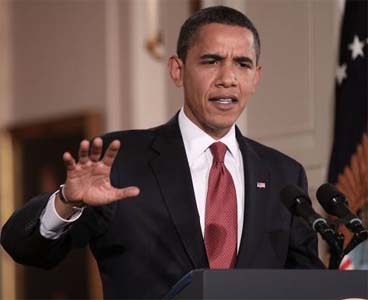US health care reform faces biggest test yet in Senate
 Washington - Another month, another milestone: US President Barack Obama's long struggle to enact far-reaching health reforms faces another hurdle Saturday in the US Senate.
Washington - Another month, another milestone: US President Barack Obama's long struggle to enact far-reaching health reforms faces another hurdle Saturday in the US Senate.
It is perhaps the most important vote to date, yet just another step in the hugely divisive process that has engulfed much of Obama's first year in office.
The chamber is expected to vote Saturday evening on whether to start debate on a health bill that aims to extend coverage and reduce health costs.
The procedural hurdle requires 60 votes to pass and would allow the full, 100-member Senate to debate health-care legislation for the first time. It could still be weeks before the Senate actually votes on whether to approve the reform bill.
Senate Majority Leader Harry Reid, who presented the Senate bill Wednesday night after weeks of talks with the White House, would not make a prediction on the outcome of Saturday's vote. Democratic leaders are furiously lobbying the three centrist members of their caucus who are most likely to vote against Saturday's measure.
With all 40 Republicans in the chamber poised to vote against it, Senate Democrats must ensure that their entire caucus supports the measure. This is not assured: some moderate Democrats are threatening to block the bill, primarily over the inclusion of a controversial, government-run insurance option.
Another battle is over abortion. Democratic Senator Ben Nelson has threatened to withhold his support for the bill because it does not clearly bar federal money from going toward abortions.
The proposed legislation would extend health insurance to a projected 31 million US residents who currently lack coverage, at a cost of 848 billion dollars over 10 years, though it claims to reduce the federal budget deficit by 130 billion dollars over that period, according to the non-partisan Congressional Budget Office.
Conservative opponents argue that the legislation will open the door to a government takeover of medical care, especially with the inclusion of the so-called "public option." Supporters argue that the option will keep private insurers honest and force better services and greater efficiency.
Reid sought a compromise by allowing individual states to opt out, yet the bill has still not attracted any Republican support.
The House of Representatives approved its own, slightly more extensive and left-leaning version of the legislation earlier this month. If the Senate manages to approve its version, the two bills would have to be reconciled before the compromise plan is again voted on by both chambers. Only after passage of the final measure can the legislation be sent to Obama's desk for signature into law. (dpa)